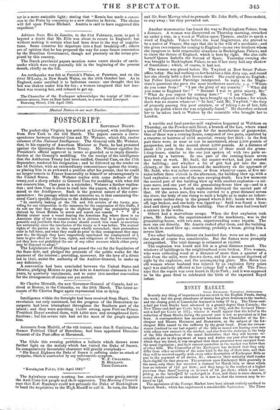POSTSCRIPT.
SATURDAY NIGHT.
The packet-ship Virginia has arrived at Liverpool, with intelligence from New York to the 23d March. The papers contain a corre- spondence between General Cass and Mr. Webster, which fills twelve columns of the National Intelligencer. The General tells Mr. Webster, that, in his capacity of American Minister at Paris, he had protested against the Quintuple Slave-trade Treaty. Mr. Webster signifies the President's official approval in terms so guarded as to imply dissatis- faction at the General's meddling. On the receipt of the intelligence that the Ashburton Treaty had been ratified, General Cass, on the 17th September, tendered his resignation ; and he followed up the tender on the 3d October, with an extraordinary remonstrance against the treaty, as placing him in so awkward a position after his protest, that he could no longer remain in France honourably to himself or advantageously to the United States. Mr. Webster replies with some defence of the treaty,and a sharp rebuke to General Cass for meddling with what did not concern him. Cass puts in a rejoinder ; Webster a further replica- tion; and then Cass is about to rush into the papers, with a letter pro- mised to the Intelligencer. Such is the general nature of the corre- spondence: the passage which most concerns us, is that containing Ge- neral Cass's specific objection to the Ashburton treaty-
" In carefully looking at the 7th and 8th articles of the treaty, pro- viding for our cooperation in the measures for the suppression of this traffic, I do not see that they change in the slightest degree the preOxisting right claimed by Great Britain to arrest and search our vessels. • • * If a British cruiser meet a vessel bearing the American flag where there is no American ship of war to examine her, it is obvious that it is quite as indis- pensable and justifiable that the cruiser should search this vessel to ascertain her nationality since the conclusion of the treaty as it was before. The mutual rights of the parties are in this respect wholly untouched; their pretensions exist in full force, and what they could do prior to this arrangement they may now do; for though they have respectively sanctioned the employment of a force to give effect to the laws, rights, and obligations of the two countries,' yet they have not prohibited the use of any other measure which either party may be disposed to adopt."
The Legislature of Michigan had passed the act for the liquidation of the State debt, and pledged the proceeds of the public works for the payment of the interest ; providing, moreover, for the levy of a direct tax in 1845, under the authority of the Auditor-General, to make up any deficiency.
A convention had been concluded between the United States and Mexico, pledging Mexico to pay the debt to American claimants in five years, by quarterly instalments, and to enter into another convention for the arrangement of claims not yet settled.


















































 Previous page
Previous page